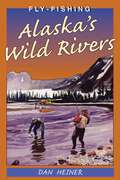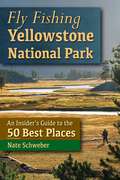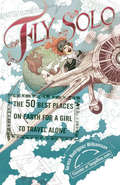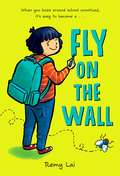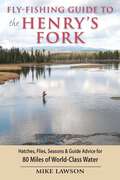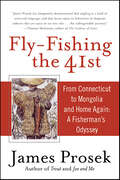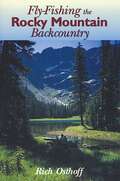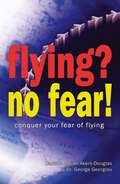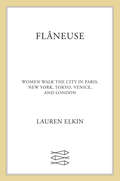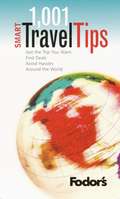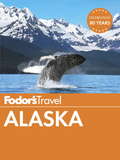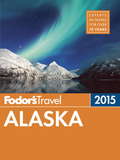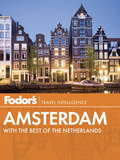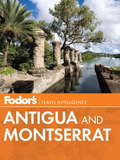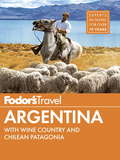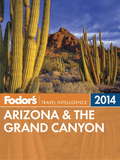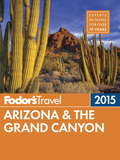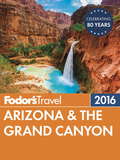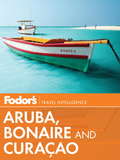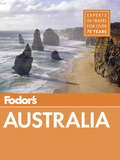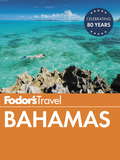- Table View
- List View
Flushing
by Jason D. AntosIn the 1890s, electric lighting and improved roads were just the beginning of the changes about to take place in Flushing, New York. Once a rural village of wide-open farms and magnificent estates, Flushing transformed into a community of more than 200,000 people and quickly became one of the busiest neighborhoods in Queens. Flushing explores these dramatic changes with many never-before-seen images. Jason D. Antos is the author of three other local history books: Whitestone, Shea Stadium, and Queens.
Fly Fishing Alaska's Wild Rivers
by Dan HeinerA guide to the best water in the state from a veteran Alaska fly fisherman and writer. With color photos of flies and streams, plus maps.
Fly Fishing Yellowstone National Park
by Nate SchweberThe most important hatches and recommended patterns, along with key fishing techniques and the best times of year to fish there.
Fly High, Fly Guy! (Fly Guy #5)
by Tedd ArnoldMom and Dad won't let Fly Guy go along on the family road trip because they're afraid he'll get lost. But when Dad accidentally shuts him in the trunk, Fly Guy goes along for the ride. <P><P>First Fly Guy gets lost at the picnic site, but he shows up in the garbage can. Then he gets lost at the art museum, but he shows up as part of a modern painting. At the beach, he turns up in a shell, and at the amusement park, on Buzz's hot dog (yuck!). Then, Dad can't figure out how to get home, and the whole family is lost -- until Fly Guy leads the way! Picture descriptions present.
Fly Solo
by Teresa Rodriguez WilliamsonThere's a whole big world out there. Here's how every woman can get out and conquer it-solo. This is an inspiring guide for women who want to "fly solo"-yet stay safe, sane, and solvent during their travels. With candid advice and insider's secrets about some of the most exciting places on earth, readers will find: - A quiz to help determine what sorts of trips best suit one's personality, interests, and goals - The essential female-friendly spots every woman should visit - Why each destination is perfect for solo travelers, important foreign phrases, what to pack, what shoes to wear, special events, historical facts, where to meet the global glitterati, and a list of the top ten things women must do while visiting - Where to eat, meet, party, people watch, sunbathe, soul-search, shop, spa, frolic, photograph, and more Whether surfing in Hawaii, strolling the cobblestone streets of St. Petersburg, drinking in Dublin, or swimming with dolphins in the Caribbean, women can take on the world and create lasting memories with the best travel companion ever-themselves! .
Fly on the Wall
by Remy LaiIn Fly on the Wall, a moving and hilarious diary-style illustrated novel from the award-winning author of Pie in the Sky, a twelve-year-old boy goes on a (forbidden) solo adventure halfway around the world to prove his independence to his overprotective family. <P><P>Henry Khoo's family treats him like a baby. He’s not allowed to go anywhere without his sister/chaperone/bodyguard. And he definitely CAN’T take a journey halfway around the world all by himself! <P><P>But that’s exactly his plan. After his family’s annual trip to visit his father in Singapore is cancelled, Henry decides he doesn’t want to be cooped up at home with his overprotective family and BFF turned NRFF (Not Really Friend Forever). Plus, he’s hiding a your-life-is-over-if-you’re-caught secret: he’s the creator of an anonymous gossip cartoon, and he's on the verge of getting caught. Determined to prove his independence and avoid punishment for his crimes, Henry embarks on the greatest adventure everrr. . . hoping it won’t turn into the greatest disaster ever. Remy Lai takes readers on an adventure filled with humor, heart, and hijinks that’s a sure bet for fans of Jerry Craft, Terri Libenson, and Shannon Hale!
Fly-Fishing Guide to the Henry's Fork
by Mike LawsonIdaho's Henry's Fork was voted the best trout stream in America by Trout Unlimited members.
Fly-Fishing the 41st: From Connecticut to Mongolia and Home Again—A Fisherman's Oddesy
by James Prosek“James Prosek has eloquently demonstrated that angling is a kind of universal language. . . . he has taken us on an unforgettable journey.” — Thomas McGuane, author of The Cadence of Grass and The Longest Silence: A Life in FishingThe New York Times has called James Prosek "the Audubon of the fishing world," and in Fly-Fishing the 41st, he uses his talent for descriptive writing to illuminate an astonishing adventure. Beginning in his hometown of Easton, Connecticut, Prosek circumnavigates the globe along the 41st parallel, traveling through Spain, Greece, Turkey, Armenia, Kyrgyzstan, China, and Japan. Along the way he shares some of the best fishing in the world with a host of wonderfully eccentric and memorable characters.
Fly-Fishing the Rocky Mountain Backcountry
by Rich OsthoffHow to reach and fish remote waters in Montana, Wyoming, Colorado, Utah, Idaho, and Oregon.
Flying, No Fear!: Conquer Your Fear of Flying
by George Georgiou Adrian Akers-DouglasWritten by an airline pilot and a clinical psychologist, this combination of practical explanation and self-help techniques is the definitive guide to help anyone overcome their fear of flying. This new edition incorporates recent advances in technology within the aviation industry, as well as increased security checks as a result of 9/11.
Flying, No Fear!: Conquer Your Fear of Flying
by George Georgiou Adrian Akers-DouglasWritten by an airline pilot and a clinical psychologist, this combination of practical explanation and self-help techniques is the definitive guide to help anyone overcome their fear of flying. This new edition incorporates recent advances in technology within the aviation industry, as well as increased security checks as a result of 9/11.
Flâneuse: Women Walk the City in Paris, New York, Tokyo, Venice, and London
by Lauren ElkinThe New York Times Book Review Editor's ChoiceThe flâneur is the quintessentially masculine figure of privilege and leisure who strides the capitals of the world with abandon. But it is the flâneuse who captures the imagination of the cultural critic Lauren Elkin. In her wonderfully gender-bending new book, the flâneuse is a “determined, resourceful individual keenly attuned to the creative potential of the city and the liberating possibilities of a good walk.” Virginia Woolf called it “street haunting”; Holly Golightly epitomized it in Breakfast at Tiffany’s; and Patti Smith did it in her own inimitable style in 1970s New York.Part cultural meander, part memoir, Flâneuse takes us on a distinctly cosmopolitan jaunt that begins in New York, where Elkin grew up, and transports us to Paris via Venice, Tokyo, and London, all cities in which she’s lived. We are shown the paths beaten by such flâneuses as the cross-dressing nineteenth-century novelist George Sand, the Parisian artist Sophie Calle, the wartime correspondent Martha Gellhorn, and the writer Jean Rhys. With tenacity and insight, Elkin creates a mosaic of what urban settings have meant to women, charting through literature, art, history, and film the sometimes exhilarating, sometimes fraught relationship that women have with the metropolis.Called “deliciously spiky and seditious” by The Guardian, Flâneuse will inspire you to light out for the great cities yourself.
Fodor's 100 Hotel Awards 2012
by Fodor'S TravelThe definitive ebook for the Fodor’s 100 Hotel Awards captures the top properties in the world for 2012. The selections span 41 countries, showcasing exemplary properties that range from a modern lodge in the Ecuadorian cloud forest to a waterfront palace in Istanbul once home to Ottoman sultans. Awards are grouped into eight exciting categories that represent the strongest travel currents of 2012, from Global Icons that help define their destinations to Trendsetter properties that are pioneering new hospitality concepts. We're confident that this collection of 100 remarkable hotels will lead to many inspired stays in the year ahead. We’ll look forward to seeing you at check-in.
Fodor's 1001 Smart Travel Tips
by Fodor'sFODOR'S EDITORS, WRITERS, AND READERS SHARE INSIGHTS Want to travel like a pro? Now you can—whether you're flying off to Europe, cruising the Caribbean, or driving across the USA. Online resources, on-the-ground contacts, tried-and-true strategies, and quirky pearls of wisdom make it easy to pick a place, book a trip, and get around like a local. Save Money Pay less for flights, hotel rooms, car rentals • Ask the right questions when you book • Get the most from online travel sites • See resolutions from complaints Stay Safe Navigate airport security • Avoid local scams • Hold on to your wits (and your belongings) anywhere in the world • Steer clear of tummy troubles • Eliminate road-trip risks Travel Smart Pick the perfect destination • Get a passport overnight • Pack right for all trips • Take airport delays in stride • Score last-minute tables and rooms with a view • Avoid cultural faux pas Resources Galore Top travel Web sites for bookings and bargains • Tourism boards and other travel sources • Packing checklists
Fodor's Alaska
by Fodor'sAlaska is a trip of a lifetime. Nowhere else can travelers kayak to glaciers; fly over the highest peak in North America; wonder at the Aurora Borealis; stay out all night celebrating the midnight sun; visit quirly towns; spot bears, eagles, moose, and whales; and learn the true meaning of the word "remote"--all in the same trip. Fodor's Alaska makes it easy to create a perfect trip from start to finish.
Fodor's Alaska 2013
by Fodor'sAlaska is a trip of a lifetime. Nowhere else can you kayak to glaciers; fly over the highest peak in North America; wonder at the Aurora Borealis; stay out all night celebrating the midnight sun; visit quirky towns; spot bear, eagles, moose, and whales; and learn the true meaning of the word remote all in the same trip.Expanded Coverage: More regional itineraries to help first-time visitors plan their perfect trip. Discerning Recommendations: Fodor's Alaska offers savvy advice and recommendations from local writers to help travelers make the most of their time. Fodor's Choice designates our best picks, from hotels to nightlife. "Word of Mouth" quotes from fellow travelers provide valuable insights.TripAdvisor Reviews: Our experts' hotel selections are reinforced by the latest customer feedback from TripAdvisor. Travelers can book their Alaska stay with confidence, as only the best properties make the cut.
Fodor's Amsterdam
by Fodor'sAmsterdam's greatest charm may also be its greatest enigma: how can such a gracious, historical treasure house also multitask as the most offbeat metropolis in the world? From Rembrandts to rock and roll, the city has always been a mesmerizing mix of old and new. Now, as this new edition reveals, Amsterdam and the entire Netherlands is being dramatically revamped for the 21st century by artisanal trendmakers, designers, star chefs, and future-forward architects. Fodor's curated coverage includes the best of the country beyond Amsterdam, including Haarlem, the Hague, Delft, and Rotterdam. Expanded Coverage: The year 2013 will be a banner one for Amsterdam, as two top museums will unveil massive renovations: the Rijksmuseum (home of Rembrandt's Nightwatch) and the Stedelijk (a modern-art collection). New write-ups showcase the city's hip "outlier" neighborhoods: North Amsterdam, the Eastern Drydocks, and the gentrifying De Wallen "Red Light" district. The dining chapter dishes on the burgeoning school of Amsterdam cuisine (turbot on a bed of beetroot and sea nettles, anyone?), and a "Netherlands Today" section focuses on high-profile topics such as the changes for "vice visitors" (laws concerning sex and drugs), contemporary design, and immigration. Illustrated Features: Packed with gorgeous color photos, this new edition will add images of iconic recent Amsterdam buildings, such as the Nemo science center designed by Renzo Piano, the ARCAM center for architecture, and Delugan Meissl's Eye Film Institute, along with new design-centric hotels such as the Conservatorium and the Andaz Amsterdam. A two-page feature presents top Dutch designers.Discerning Recommendations: This edition offers savvy advice and recommendations from local writers to help travelers make the most of their time. Fodor's Choice designates our "best picks," from hotels to nightlife and beyond. "Word of Mouth" quotes provide valuable insights from fellow travelers.
Fodor's Antigua & Montserrat
by Fodor'sGet inspired and plan your next trip with Fodor's ebook travel guide to Antigua and Montserrat. Easy navigation makes it simple for you to move through each section of the ebook with a simple touch. To get your bearings, browse a brief overview and peruse full-color maps of the islands. You'll immediately develop a sense of each island's awe-inspiring beauty as you flip through a vivid full-color photo album. Read more about the islands and find all of the essential, up-to-date details you expect in a Fodor's guide: From the best dining and lodging to top beaches and attractions, Fodor's has it all. Discover three great Caribbean islands in one ebook. At 108 square miles, Antigua is the largest of the British Leeward Islands and with its sister island Barbuda comprises 365 excellent beaches, one for every day of the year. Although the Soufrière Hills volcano continues to rumble in Montserrat, the island is otherwise as peaceful as the Caribbean gets--almost a throwback to another time, with the occasional modern convenience thrown in. Fodor's helps you unleash the possibilities of travel with the insightful tools you need to experience the trips you want. Plan your ideal trip armed with the assurance of our expertise, the guarantee of selectivity, and the choice details that define a destination. Note: This ebook edition includes photographs and maps that will appear on black-and-white devices but are optimized for devices that support full-color images.
Fodor's Argentina
by Fodor'sFodor's correspondents highlight the best of Argentina, including Buenos Aires's cultural riches, Mendoza's scenic wine valleys, and Patagonia's rugged beauty. Our local experts vet every recommendation to ensure you make the most of your time, whether it's your first trip or your fifth. MUST-SEE ATTRACTIONS from Iguazú Falls to the Lake District PERFECT HOTELS for every budget BEST RESTAURANTS to satisfy a range of tastes GORGEOUS FEATURES on tango, gauchos, and wine VALUABLE TIPS on when to go and ways to save INSIDER PERSPECTIVE from local experts COLOR PHOTOS AND MAPS to inspire and guide your tripOOLS: Top Attractions, Great Itineraries, and Tango features make it easy to plan a vacation. Best bets charts for restaurants and hotels; easy-to-read color regional maps; and tips on Argentine wine, steak, markets, and sporting life give useful tools to dive into the culture.DISCERNING RECOMMENDATIONS: Fodor's Argentina offers savvy advice and recommendations from local writers to help travelers make the most of their time. Fodor's Choice designates our best picks, from hotels to nightlife. INCLUDES: Buenos Aires, Mendoza, Salta, the Lake District, Iguazu Falls, Quebrada de Humahuaca, the wine regions, Colonia del Sacramento in Uruguay, and Patagonia.ABOUT FODOR'S AUTHORS: Each Fodor's Travel Guide is researched and written by local experts.
Fodor's Arizona & the Grand Canyon 2013
by Fodor'sTravelers continue to flock to Arizona to explore the outdoors and the state's three national parks, visit the outstanding museums and galleries, play golf, relax at world-class spa resorts, learn about Navajo and Hopi culture, eat Mexican food, and sample the tequila.Expanded Coverage: The 2013 edition features expanded coverage on spas and golf courses, highlighting features and amenities at these properties. There is also coverage of new restaurants and hotels in Phoenix and Tucson. Discerning Recommendations: Fodor's Arizona & the Grand Canyon offers savvy advice and recommendations from local writers to help travelers make the most of their time. Fodor's Choice designates our best picks, from hotels to nightlife. "Word of Mouth" quotes from fellow travelers provide valuable insights.TripAdvisor Reviews: Our experts' hotel selections are reinforced by the latest customer feedback from TripAdvisor. Travelers can book their Arizona stay with confidence, as only the best properties make the cut.
Fodor's Arizona & the Grand Canyon 2015
by Fodor'sFodor's correspondents highlight the best of Arizona, including awe-inspiring canyons and deserts, stellar spas and golf courses, and Native American culture. Our local experts vet every recommendation to ensure you make the most of your time, whether it's your first trip or your fifth. MUST-SEE ATTRACTIONS from national parks to Sedona PERFECT HOTELS for every budget BEST RESTAURANTS to satisfy a range of tastes GORGEOUS FEATURES on stargazing and outdoor adventures VALUABLE TIPS on when to go and ways to save INSIDER PERSPECTIVE from local experts COLOR PHOTOS AND MAPS to inspire and guide your tripelp travelers choose activities based on their interests. Spotlights highlight spas, Phoenix-area golf, visiting Native American reservations, the Wild West, and Tucson "south of the border" cuisine. INDISPENSABLE TRIP PLANNING TOOLS: This book has a pull-out map covering the whole state as well as Phoenix and the Grand Canyon in more detail. Restaurant and hotel "Best Bets" sections plus "Dining and Lodging" atlases in Phoenix and Tucson make locating a hotel or meal simple. A "Top Picks" chart for Grand Canyon hiking trails helps travelers choose a hike based on length, grade, trail conditions, time of year, and level of difficulty. DISCERNING RECOMMENDATIONS: Fodor's Arizona & the Grand Canyon 2015 offers savvy advice and recommendations from local writers to help travelers make the most of their time. Fodor's Choice designates our best picks, from hotels to nightlife. INCLUDES: Phoenix, Scottsdale, Tempe, Tucson, the Grand Canyon, Sedona, Petrified Forest National Park, Monument Valley, Yuma, the Hoover Dam, Flagstaff, and more. ABOUT FODOR'S AUTHORS: Each Fodor's Travel Guide is researched and written by local experts.
Fodor's Arizona & the Grand Canyon 2016
by Fodor'sTravelers continue to flock to Arizona year-round to explore the outdoors and relax at world-class spa resorts. In full-color throughout, Fodor's Arizona and the Grand Canyon helps travelers take advantage of the state's myriad pleasures, including outstanding museums and galleries, Navajo and Hopi cultural experiences, top-notch golf, three national parks, and excellent Mexican food and tequila.From the Trade Paperback edition.ivities based on their interests. Spotlights highlight spas, Phoenix-area golf, visiting Native American reservations, and the Wild West. * INDISPENSABLE TRIP-PLANNING TOOLS: This book has a pull-out map covering the whole state as well as Phoenix and the Grand Canyon in more detail. Restaurant and hotel Best Bets sections plus "Dining and Lodging" atlases in Phoenix and Tucson make locating a hotel or meal simple. A Top Picks chart for Grand Canyon hiking trails helps travelers choose a hike based on length, grade, trail conditions, time of year, and level of difficulty. * DISCERNING RECOMMENDATIONS: Fodor's Arizona & the Grand Canyon offers savvy advice and recommendations from local writers to help travelers make the most of their time. Fodor's Choice designates our best picks, from hotels to nightlife. * INCLUDES: Phoenix, Scottsdale, Tempe, Tucson, the Grand Canyon, Sedona, Petrified Forest National Park, Monument Valley, Yuma, the Hoover Dam, Flagstaff, and more. * PULLOUT MAP: A handy take-along map provides added value, giving travelers essential information about top attractions so they can travel with confidence. * ABOUT FODOR'S AUTHORS: Each Fodor's Travel Guide is researched and written by local experts.
Fodor's Aruba, Bonaire & Curacao
by Fodor'sGet inspired and plan your next trip with Fodor's ebook travel guide to Aruba, Bonaire, and Curacao. Easy navigation makes it simple for you to move through each section of the ebook with a simple touch. To get your bearings, browse a brief overview and peruse full-color maps of the islands. You'll immediately develop a sense of each island's awe-inspiring beauty as you flip through a vivid full-color photo album. Read more about the islands and find all of the essential, up-to-date details you expect in a Fodor's guide: From the best dining and lodging to top beaches and attractions, Fodor's has it all. Discover three great Caribbean islands in one ebook. Aruba is the smallest of these ABC (Aruba, Bonaire, and Curacao) islands, with soft, sandy beaches, turquoise waters, and thriving nightlife. Bonaire is a hot spot for divers looking to explore some of the best sites this side of Australia's Great Barrier Reef. Curaçao sits below the hurricane belt, resulting in weather that is almost always alluring, even during the off-season. Fodor's helps you unleash the possibilities of travel with the insightful tools you need to experience the trips you want. Plan your ideal trip armed with the assurance of our expertise, the guarantee of selectivity, and the choice details that define a destination. Note: This ebook edition includes photographs and maps that will appear on black-and-white devices but are optimized for devices that support full-color images.
Fodor's Australia
by Fodor'sFodor's correspondents highlight the best of Australia, including the glamorous beaches outside Sydney, the magnificent Great Barrier Reef, and the rugged beauty of the Outback. Our local experts vet every recommendation to ensure you make the most of your time, whether it's your first trip or your fifth. MUST-SEE ATTRACTIONS from Tasmania to Western Australia PERFECT HOTELS for every budget BEST RESTAURANTS to satisfy a range of tastes GORGEOUS FEATURES on food, wine, and Aboriginal art VALUABLE TIPS on when to go and ways to save INSIDER PERSPECTIVE from local experts COLOR PHOTOS AND MAPS to inspire and guide your tripamut from alfresco dining to exploring Sydney's top sights; how to plan outdoor adventures in Victoria, Tasmania, the Daintree National Park, and the Great Barrier Reef; where to find the best beaches and coastal and wilderness walks in Queensland; and how to plan your excursions into the Outback. DISCERNING RECOMMENDATIONS: Fodor's Australia offers savvy advice and recommendations from local writers to help travelers make the most of their time. Fodor's Choice designates our best picks, from hotels to nightlife. "Word of Mouth" quotes from fellow travelers provide valuable insights. ABOUT FODOR'S AUTHORS: Each Fodor's Travel Guide is researched and written by local experts.
Fodor's Bahamas
by Fodor'sWhether a traveler's style is living large at a trend-setting resort or chilling on a secluded island with an icy cold beer in your hand, the Bahamas has something for every taste. Visitors can enjoy celebrity-chef restaurants and glitzy casinos in Nassau and Freeport, or escape to the pink sands of an undeveloped out island. The Bahamas are the ideal destination to eat lots of conch, get a golden tan, and feel totally revived. Expanded Coverage: The Bahamas are ever-changing, and this edition includes new resorts, restaurants, sports and activity outfitters, and attractions.Indispensable Trip Planning Tools: An island finder helps readers choose the perfect Bahamian island. Each chapter opens with an island orientation map, the top reasons to go, and other essential information to help visitors plan their time effectively. Discerning Recommendations: Fodor's Bahamas offers savvy advice and recommendations from local writers to help travelers make the most of their time. Fodor's Choice designates our best picks, from hotels to nightlife. "Word of Mouth" quotes from fellow travelers provide valuable insights.ABOUT FODOR'S AUTHORS: Each Fodor's Travel Guide is researched and written by local experts.

